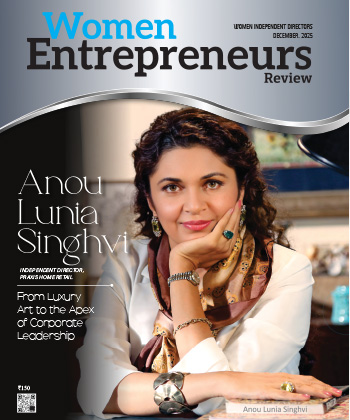
Digitization Facilitating Personalization of Services in Hospitality
By: Sunita Chaudhry, Vice President, Motherson Group
Sunita Chaudhary, Vice President of Motherson Group, has 25 years of experience in the service industry. She has previously worked with Sahara Airlines, TravelGuru.com, and Cox & King. Currently, Sunita currently heads the travel vertical at Motherson Group.
In a recent conversation with the Women Entrepreneurs Review Magazine, Sunita shares her thoughts on the rapid growth of the Indian hospitality sector post-Covid. She highlights the significance of digitization that helps to catalyze the hospitality businesses ensuring profitability and personalization of services.
Given the shifts with increased hybrid and virtual events, how is the current hospitality market evolving? What strategies should industry leaders adopt to remain competitive while ensuring profitability?
In my tenure of the last 25 years, we have witnessed rapid growth in the Indian economy specifically after COVID. The hospitality industry has experienced a 25% growth post-COVID, driven by the convenience of online shopping and technology, The clients have become laid back and expect immediate, excellent, and fast services. They are less patient and prefer quick solutions over shopping. Focusing on excellent and timely service has become the primary strategy to remain competitive in the market. After delivering accurate and reasonable services, clients may not shop around. Human psychology is, to prefer to repeat the same vendor. This human psychology suggests that customers are willing to pay extra for excellent service and repeat business with the same vendor once the vendor has built up a repo with the client.
In times of market volatility, hospitality businesses often need to pivot quickly. How can leaders balance long-term brand-building efforts with the need to generate short-term sales in unpredictable market conditions?
During my tenure, I have seen several ups and downs in the industry. I have witnessed the 2008 recession and the hitch of GST implementation, the Taj tragedy, and COVID-19. During each of the aforementioned crises, the service industry was on hold for a while and this strategy was effective.
In my experience, leaders in hospitality need to work with patience and persistence with a focus on long-term revenue. Short-term mortality in the market is difficult to be controlled on an immediate basis. But yes, being calm and consistent in that phase allows you to work on balancing and building the business’ future.
The MICE segment is a key revenue driver for many in the hospitality industry. How do you foresee the future of MICE events evolving?
The Indian economy is growing, leading to an increase in virtual events, particularly in MICE. This growth is not limited to corporations, as people are spending more money on travel than saving money. MICE is not meant for small pocket owners, as they need deep pockets to operate effectively. Advancements in technology have made it easier to hire talent and connect with clients remotely. However, getting the right talent is challenging, especially for salespeople who need to maintain their territory for business generation. To redefine corporate union experiences, AI technology can be used to engage and connect with clients, ensuring frequent interaction with clients.
In a climate where many businesses are cutting down on expenses, what role does client relationship management play in sustaining business?
Clients are cutting expenses due to technology simultaneously they are growing their business. As the economy grows, companies are adopting technology and reducing travel. As a result, the client's business is also growing.
To generate more business for travel, frequent physical engagement with the client is a must. I have adopted the strategy of the multi-level marketing sector &Insurance sector, which involves engaging clients regularly, ensuring long-term relationships, and fostering a strong client relationship.
There’s a growing demand for experiential, personalized events. How can hospitality leaders align this trend with profit-centered management?
This particular segment of personalizing everything is increasing drastically where the client requires everything personalized and aligned with its brand. It could be for a social event or it may be a corporate event. Companies need everything personalized to cope with travel, merging execution with the event companies.
We have tied up with a few event companies that specialize in this segment. It's a two-way demand as the event companies also need some involvement and travel experts to familiarize them with a client's need to make their job easy. Concerning traditional revenue streams, in segment adaptation, AI, and advanced technology, digital marketing plays a crucial role in personalizing events.
In an increasingly crowded marketplace, how can hospitality brands differentiate themselves in corporate sales without relying solely on price competition?
The key to differentiation in corporate sales for hospitality brands is personalized service, punctuality, and quality. These factors not only help in closing sales but also reduce time and effort spent on personal tasks. Adapting to the latest technology and interacting with clients makes them more connected.
Today, customers have more time and money, but they don't mind shelling out extra for personalized services. Technology has helped alleviate stress and make it easier for middle-class females to order services online, eliminating the need to stand in line for boarding passes, etc.
Message to Readers
The service industry faces challenges such as a shortage of customers and employees, but it's growing rapidly. Despite a negative phase in the recent past, every 11 people in the workforce is connected to this industry. It is one of the world's largest and most beautiful careers, making it a worthwhile career choice.
Most Viewed
- 1 Women's Health Startup HerMD Closing Doors Amid Industry Challenges
- 2 5 Famous Women in Indian Armed Forces
- 3 Saudi Women No longer Require Male Permission for Clothing Choices, says Prince MbS
- 4 Kolkata Medtech Startup Innovodigm Raises Rs 5.5 Crore Seed Funding Led by IAN Group
- 5 Yamunanagar's Kashish Kalra Honoured after Securing 111th Rank in UPSC Civil Services Exam
- 6 Madurai Appoints Its First Woman Corporation Head
- 7 IAS Vijayalakshmi Bidari Appointed as the new Nagpur Divisional Commissioner
- 8 American Entrepreneur Lucy Guo Overtakes T Swift to become Youngest Female Billionaire
- 9 ICC Women's World Cup 2025 Trophy Showcased at Indore's Holkar Stadium
- 10 Aparna Saxena's Beauty Venture AntiNorm Launches in India
- 11 Vidya Nataraj Co-Founded BlueStone Jewellery & Lifestyle files IPO
- 12 5 Women Freedom Fighters of India
- 13 Dr. G Krishnapriya appointed as CEO for Trichy
- 14 M3M & Sirona Partner to Introduce Menstrual Hygiene Vending Machines in 15 Locations
- 15 Punjab Govt launches SHE Cohort 3.0 Supporting Tech-led Women Startups
- 16 Indian origin Lawyer, Sweena Pannu appointed as the US New Superior Court Judge
- 17 The Aurora Tech Award recognizes 4 Indian Women-led Startups
- 18 Kerala's Republic Day parade featured an all-female tableau
- 19 Manisha Kabbur Becomes Karnataka's First Woman International Karate Coach
- 20 Director K. S. Ravikumar's Daughter Maalica Ravikumar Launches Life Coaching Company 'Evergrowth Academy' for Women
- 21 Leezu's Raises Pre-Seed Funding to Accelerate Growth in Sexual Wellness Industry
- 22 Sattu: Super-easy summer drink for PCOS gut healing
- 23 Swathi Nelabhatla creates Sitha App, India's First Women-Exclusive Gig Platform
- 24 7 Timeless Female Kathak Dancers & their Iconic Legacies
- 25 Meet 7 Iconic Women Architects of Modern India & their Most Impactful Work
- 26 This Woman-led Insuretech Startup is Helping Bridge the Education Financing Gap in India
- 27 Women Leaders Share Lessons Learnt from India Women's WC Win
- 28 5 Enterprising Women Founders Powering Singapore's Tech & Innovation Landscape
- 29 4 Women. 4 Stories. One Vision for Smarter, Stronger Healthcare
- 30 Global Gender Gap Narrows to 68.8%, But Full Equality 123 Years Away: WEF Report 2025
- 31 Changemakers: 7 Women Entrepreneurs Taking the Make in India Movement Forward
- 32 Meet Lucy Guo, The Youngest Self-Made Female Billionaire Disrupting Tech
- 33 How Women are Driving India's Festive Online Shopping Surge






